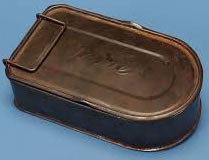
On an episode of Uncle Mort’s North Country, a comedy drama on Radio 4 Extra that I listened to today, I heard the word snap used for a packed lunch. I’e heard it before, but wasn’t sure where it came from. The drama features two characters from Yorkshire: Uncle Mort and his nephew, Carter Brandon, who both speak with strong Yorkshire accents, so I thought snap might be a Yorkshire word.
I found it in a Yorkshire Dialect Dictionary defined as ‘a light meal’, and Wiktionary defines it as ‘a small meal, a snack; lunch’.
According to the The Oxford Guide to Etymology, lunch boxes were once called snap-tins in parts of the UK, and the word snap came to mean a a light meal or quick bite by metaphorical extension.
In A History of the Word on the BBC website it says that miners used snap tins to carry their lunch down the pits – the photo is an example of a miner’s snap tin.
The word snap comes from the Dutch / Low German snappen (to bite; seize), from the Proto-Germanic *snappōną (to snap; snatch; chatter), from the Proto-Indo-European *ksnew- (to scrape; scratch; grate; rub) [source].
What do you call a container you put your lunch in?


